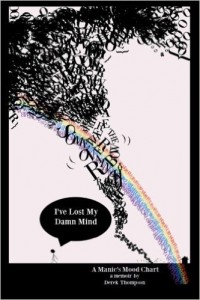Title: Somewhere Over the Rainbow, I’ve Lost My Damn Mind: A Manic’s Mood Chart
Author: Derek Thompson
Publisher: CreateSpace
ISBN: 978-1467935234
Pages: 228, Paperback/Kindle
Genre: Memoirs/Non-Fiction
Reviewed by: Tamar Mekredijian, Pacific Book Review
Pacific Book Review
Somewhere Over the Rainbow, I Lost My Damn Mind: A Manic’s Mood Chart by Derek Thompson is a memoir that focuses on Thompson’s Bipolar Disorder, outlined by the colors of the rainbow to portray his states of mind, ranging from Depressed, Normal to Elevated. Each color indicates whether these states of mind are mild, moderate or severe. The book began as a series of blog entries, which Thompson put together to compile a mood chart, depicting his progress. The entries are grouped and placed under their appropriate colors as an indication of his mood at the time the entry was written. The reader finds Thompson in hopeless, excited, and confused moments of his life. Thompson lets the reader into his darkest moments, as well as into his thoughts about feeling inferior because he has Bipolar Disorder. The blog entries are broken up by “sessions” with Dr. John-Paul Heathrow that attempt to explain what the blog entry reveals about his progress of understanding and coping with Bipolar Disorder.This book is for anyone who has either directly or indirectly experienced chronic illness in their life, whether they’re sick themselves or taking care of someone who is. Thompson does a good job mixing humor and his honest thoughts about his illness to bring the reader in gently, and keep them reading. He strives to give the reader a full understanding of his condition by being honest about his episodes of mania and depression, addressing them head on. He also speaks candidly about how the people around him act toward him, and how he feels about it: “To think I was in a state of mind that caused me to behave in such a way that others feared me–it’s something I have trouble grasping…Having this label thrust upon you, implying that you are unstable and a threat to others, takes just about everything you know about yourself and throws it out the window. You feel nonhuman” (page 146). Throughout the book, he wrestles with the fact that Bipolar Disorder defines who he is, what others think of him because of it, and finally decides to embrace it.
Thompson’s “sessions” with “JP” are a bit distracting and feel forced. Most of them do address the entries, but not in a way that helps the reader better understand the specific mood that Derek is experiencing. These “sessions” don’t read like real conversations. They are brief vignettes that seem to break up the text and distract the reader rather than inform. Placing them every ten to fifteen entries might have been a bit more effective, giving the reader a brief pause and seeing Thompson in conversation with a helpful doctor. On another note, Thompson’s sense of humor is apparent both in his entries and during his “sessions” and is quite entertaining.
Thompson’s memoir is both informative and motivational. He doesn’t conceal his fears, frustrations, or his triumphs. In society, illness, especially ones that are chronic or life-threatening, is looked down upon and feared. For one reason or another, this can’t be helped. Thompson doesn’t shy away from trying to understand and accept this. He boldly expresses how he is feeling in each entry, and attempts to fully understand what methods of treatment help him feel better. He speaks against doctors who don’t give him their full attention, and merely push new medications on him instead of taking the time to review his records and really understand what kinds of treatment he needs. He knows he is different, and he also knows that others get nervous around him, but he doesn’t blame them, nor resent them. He believes that his Bipolar Disorder is a part of him, and that it’s not a downfall. He is determined to pursue his dreams in spite of his bipolar disorder, but he also isn’t afraid to put them on hold if it’s what’s best for him at the time. Overall, Thompson’s memoir is an honest look at illness and what it does to both body and soul. It’s a journey of finding himself when he thought he’d lost it.



Follow Us